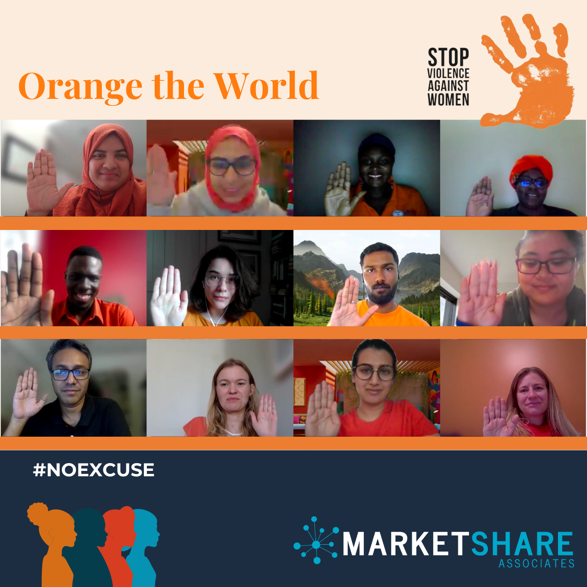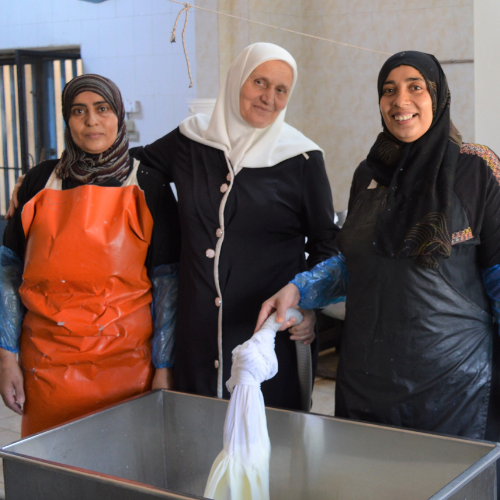Author: Erin Markel, MSA Co-Founder and Chief Growth Officer

Photo: MSA team members stand in solidarity with UN Women’s 16 Days of Activism against Gender-Based Violence initiative
As we celebrate our 10-year anniversary in 2024, MarketShare Associates (MSA) reflects on our evolution and commitment to affecting equitable systems change as a small, woman-owned business. Founded on the belief that development must be systemic and inclusive, MSA has grown to impact communities worldwide. We are a proud signatory of the Women’s Empowerment Principles (WEP) and integrate these values into every aspect of our work, ensuring that our efforts contribute to a more equitable world.
MSA began and continues with a clear mission: to provide actionable insights to economic development and to create a more equitable world using systems-thinking. We recognize that traditional development approaches sometimes fall short of addressing systemic issues. We seek to disrupt the status quo by doing development differently—with enhanced learning, private sector and multi-actor engagement, and inclusion as cornerstones to our approach.
Systems are dynamic; if we do not evolve, current practice and research may become outdated and ineffective. Our commitment to continuous learning ensures that we stay ahead of the curve and can implement adaptable strategies that drive sustainable impact. This adaptability is crucial in the ever-changing landscape of global development. We are proud to have published a wide array of resources and tools that stem from new perspectives, insights and lessons learned.
“We envision an equitable world where all people have access to better opportunities and choices to improve their lives. By embracing continuous learning at MSA, we ensure our strategies remain effective and impactful in the long-term.” – Erin Markel, MSA Co-Founder
Another key approach that MSA leverages is engaging the private sector and multiple actors. In many development contexts, certain actors are often left out of the conversation, yet their participation is crucial for realistic solutions. By bringing these stakeholders into the fold, we ensure that development efforts are comprehensive, inclusive, and built with the appropriate buy-in from stakeholders. This multi-actor engagement is vital for addressing complex challenges and driving systemic change.
Systems typically revert to the status quo if inclusive practices aren’t established and prioritized, especially at the institutional level. We strive to change power dynamics at the systems level through inclusion. This approach fosters equity and strengthens the resilience and sustainability of development outcomes. Inclusion is not just a goal; it’s a fundamental strategy to prevent systems from snapping back to inequitable norms.
Being a woman-owned business, we have faced challenges related to inclusion, such as balancing growth with additional care responsibilities and overcoming gender stereotypes when accessing credit and financing. Our experience is not unique and resonates with many women entrepreneurs globally, which strengthens our resolve to create more inclusive systems that empower other women-owned businesses.

Photo: Arab Women’s Enterprise Fund Activity
This resolve has influenced our work substantially, with the Arab Women’s Enterprise Fund (AWEF) being a prime example of “ripple-effect” impact. AWEF was a five-year program in Jordan aimed at increasing women’s participation in the economy by fully incorporating gender dynamics into a systems-based approach. This initiative effectively introduced a Women’s Chamber of Commerce model to Jordan. We implemented a market systems approach to support the creation of a “learning hub” designed to conduct select studies, leading to the establishment of Women’s Economic Empowerment (WEE) units.
WEE units provided a dedicated space for Jordanian women entrepreneurs to access resources, training, and support in a women-only environment. After a successful introduction, these units eventually scaled across Jordan, transforming the lives of many women and empowering them to contribute meaningfully to their communities and economies.
Our success with initiatives like AWEF stems partly from the support and resources we receive from the broader business and global development communities.
As we continue to grow and expand our global impact, we are grateful for the opportunities the Small Business Association for International Companies (SBAIC) provides. Our SBAIC membership has been instrumental in our growth and ability to engage new business, allowing us to extend our reach and enhance our efforts by opening doors and providing a platform to share our experiences and accomplishments. With this, MSA looks forward to driving even greater positive systems change in the years ahead.





